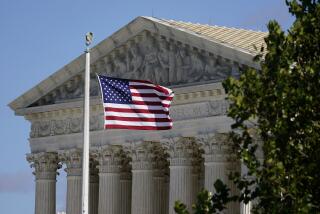Home Office Tax Deduction Curbed by Supreme Court : IRS: To qualify, people must do most of their work at their residences, justices say. A looser ruling is reversed.
- Share via
WASHINGTON — The Supreme Court made it harder Tuesday for self-employed professionals and business people to claim a tax deduction for a home office, ruling that they must do most of their actual work there to qualify.
The 8-1 decision reverses a more lenient standard set by the U.S. Tax Court, which would have permitted deductions if a business person said a home office was essential to his work.
The ruling will have an impact, for example, on doctors who see patients at hospitals but maintain an office at home, or electricians, carpenters or salespeople who travel to work sites but maintain an office at home.
Under the Tax Court’s standard adopted in 1990, those taxpayers could have claimed a deduction because their office is essential to their business. But the Supreme Court said Tuesday that such deductions should be disallowed because the office is not truly the taxpayer’s “principal place of business.”
In 1976, Congress tightened the tax laws because millions of employees were taking deductions for after-hours work that they did at the dining room table or in a spare bedroom. The new law said deductions would be permitted only when a “portion of the dwelling unit . . . is exclusively used on a regular basis . . . as the principal place of business for any trade or business of the taxpayer.”
The key phrase was “principal place of business.” In its initial interpretations, the Tax Court said the taxpayer’s home office must be the “focal point” of his business activity.
But three years ago, the Tax Court dropped that definition and expanded the basis for the deduction in the case of a self-employed anesthesiologist who saw patients in three suburban Washington hospitals.
Dr. Nader E. Soliman spent 30 to 35 hours at the hospitals administering anesthesia and caring for patients. He was not provided with an office in the hospitals. Instead, he set up an office in a spare bedroom of his suburban Virginia condominium and spent 10 to 15 hours each week there doing paperwork. On his 1983 tax return, he claimed a deduction of $2,500 for this office.
The IRS disallowed the deduction, but the Tax Court reversed that decision and ruled that his home office was the “true headquarters of the business.” Dr. Soliman’s home office was essential to his business, he spent “a substantial amount of time there” and he had “no other location available” for his office. For such taxpayers, a home deduction is justified, the Tax Court said. Its ruling was affirmed by a U.S. appeals court in Richmond in 1991.
The decision set off alarms at the IRS, which predicted that hundreds of thousands of taxpayers could seek refunds because they had maintained an essential office at home.
Last year, the Supreme Court announced that it would hear an appeal in the case (IRS vs. Soliman, 91-998).
Justice Anthony M. Kennedy, writing for the court, pointed out that the law did not refer to the taxpayer’s “principal office,” but rather to his “principal place of business.”
“There are two primary considerations in deciding whether a home office is a taxpayer’s principal place of business: the relative importance of the activities performed at each business location and the time spent in each place,” Kennedy said.
It does not matter, he said, that Dr. Soliman’s paperwork is “necessary to the business.” Although that is undoubtedly so, the “actual treatment of patients was the essence of the professional service,” he said.
Moreover, he spent 30 to 35 hours each week in hospitals, contrasted with only 10 to 15 hours doing paperwork at home.
“The home office activities, from an objective standpoint, must be regarded as less important to the business of the taxpayer than the tasks he performed at the hospital,” Kennedy said. Therefore, the deduction should be disallowed.
Justice John Paul Stevens, who does much of his court work at his Virginia residence and at a vacation home in Florida, dissented. The ruling “unfairly denies an intended benefit to the growing number of self-employed taxpayers who manage their business from a home office,” he said.
More to Read
Inside the business of entertainment
The Wide Shot brings you news, analysis and insights on everything from streaming wars to production — and what it all means for the future.
You may occasionally receive promotional content from the Los Angeles Times.











